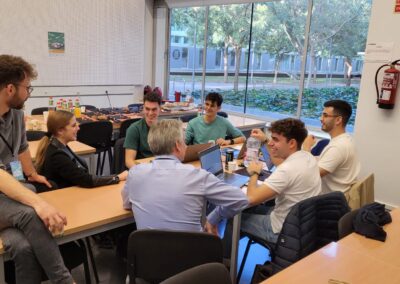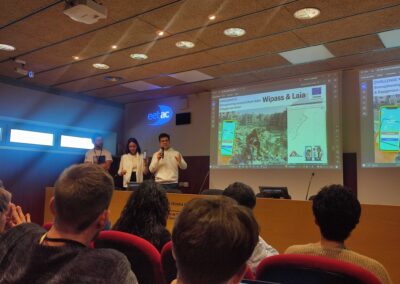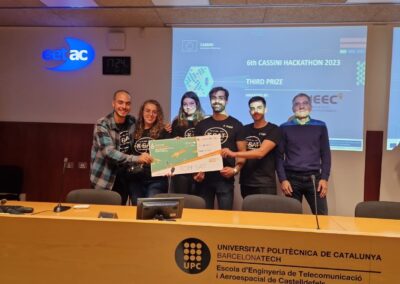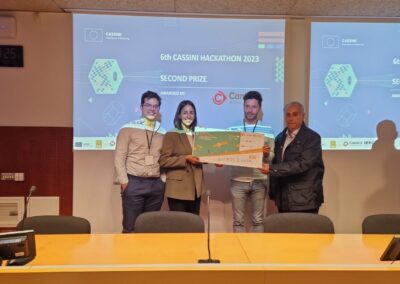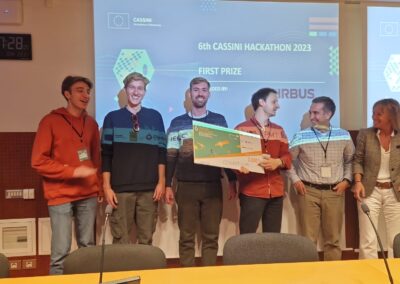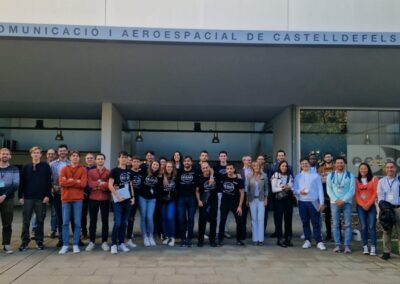The 6th Cassini hackathon promotes 6 projects to enhance international development and humanitarian aid through space technology
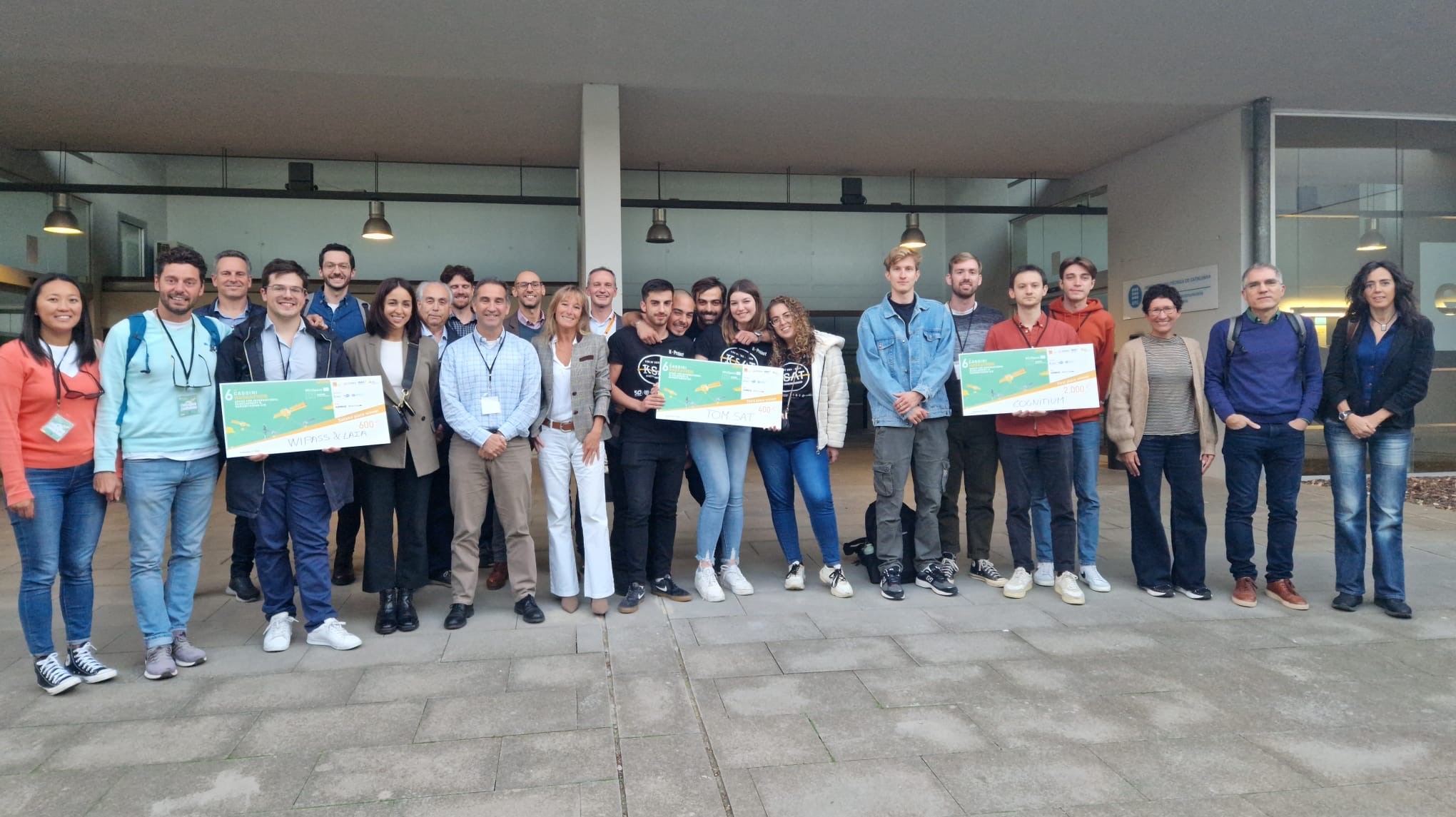
The Cassini hackathon closed its 6th edition this Sunday in Catalonia, this year focused on connecting space with international development and humanitarian aid, with 80 participants registered and promoting 6 projects.
The competition was held simultaneously from 3 to 5 November in ten European countries such as Germany, the Netherlands, Croatia and Estonia. Catalonia has been chosen for the second time in the six editions of the hackathon as one of these locations, specifically at the School of Telecommunications and Aerospace Engineering (EETAC) of the Universitat Politècnica de Catalunya – BarcelonaTech (UPC), located in the Mediterranean Science and Technology Park of Castelldefels.
The aim of the Cassini hackathon is to create innovative solutions that respond to different global challenges using technology and data obtained from space. This time the teams, made up of people from different professional and academic backgrounds, have focused their proposals on 3 major challenges: the development of sustainable infrastructures, food security and access to drinking water and the understanding and prevention of forced migrations.
The Catalan edition of the hackathon was organised by the Knowledge Innovation Market Private Foundation, the Institute of Space Studies of Catalonia (IEEC — Institut d’Estudis Espacials de Catalunya), the Cartographic and Geological Institute of Catalonia (ICGC) and the Barcelona Chamber of Commerce. The event also had Airbus and Open Cosmos as official sponsors, as well as the support of the Mediterranean Science and Technology Park – PMT, the EETAC and the UPC.
An initiative to promote entrepreneurship in space
As a basis for developing their idea, the participants had access to data obtained from the satellites of the European space programmes Copernicus and Galileo.
During the 3 intense working days of the hackathon, the teams were accompanied by different mentors from organisations such as Open Arms, Médecins Sans Frontières, Airbus, Space Sur, the IEEC, the ICGC, Osmium, the UPC, Sateliot, World Mobile, ASCAME, Satellogic, ESA-BIC-BCN, i2Cat and Kreios Space
The competition jury was made up of Josep Closa, head of Microwaves Instruments Future Programs & Proposals at Airbus; Vicente Atienza, head of innovation projects at the Barcelona Chamber of Commerce; Mònica Roca i Aparici, founder and director of the isardSAT group; Antoni Paz, executive director of the KIMBCN Foundation; Verònica Tercero, coordinator of the Catalan Government’s NewSpace Strategy; Jordi Berenguer, deputy director of external and international relations at EETAC-UPC; Elisabeth Jordà, director of Strategy and Innovation at PMT-UPC; and Lluís Foreman, from the Services and Industrial Promotion Office of the Area for the Promotion of the Space Sector of Catalonia (APEC), within the IEEC.
Of all the proposals submitted, the jury selected three as the best of the hackathon. The first prize, presented by Josep Closa (Airbus), went to the COGNITUM project, an application using satellite data to predict the risk of insect infestation in crops, designed to be applied in regions at risk of pandemics or water shortages.
The second prize, presented by the president of the Baix Llobregat Territorial Chamber, Carles Guilera, was awarded to the WIPASS & LAIA project and the third prize, presented by the director of the Area for the Promotion of the Space Sector of Catalonia (APEC), Josep Colomé, was awarded to the TOM SAT project.
The three winning teams have received 3,000 euros in prizes, as well as access to technical, legal and business advice to make their project a reality. In addition, the winner will compete on a European scale with the winning projects from the other participating locations and, if they win, they will receive an additional 100 hours of mentoring from experts.
Finally, the first and second prize-winning teams will have the opportunity to present their project at the New Space Congress Barcelona 2023, which will be held on 22 and 23 November at La Llotja de Mar and will bring together representatives from the space sector on an international scale.
Winning projects of the 6th Cassini hackathon in Catalonia
| PRIZES | PROJECT | PARTICIPANTS | SUMMARY |
|
First prize (2.000 €, technical, legal and business advice and presentation at the Barcelona New Space Congress 2023) |
COGNITUM | Bernhard Bockenhoff, Georgi Gevorgyan, Jakub Glowacz i Giovanni Pardini | Application with satellite data from the Copernicus programme, the European Alien Species Network (EASIN) and Artificial Intelligence techniques to predict the risk of insect infestation in crops, thus providing a warning system through a scalable and environmentally friendly solution that can be applied in regions at risk of pandemics or water scarcity. |
|
Second prize (600 €, technical, legal and business advice and presentation at the Barcelona New Space Congress 2023) |
WIPASS & LAIA | Nil Mandri, Jonatan Domenech i Mariam Ayadi | It provides a network of WiPass devices to create a digital humanitarian corridor in war and conflict zones, using Near Field Communication (NFC) technology to obtain emergency connectivity and relevant information (e.g. location of refugee camps, water sources, areas to avoid, etc.) by leveraging space data from the Copernicus programme and satellite telecommunications. |
|
Third prize (400 €, technical, legal and business advice) |
TOM SAT | Francisco Crespo, Luis Rodríguez, María del Castillo González, Matilde Nieto i Víctor Gavira | Application to predict the most suitable type of crop according to climatic conditions and soil characteristics based on data from the Copernicus programme, thus improving crop optimisation in areas that are suffering from the climatic changes that are currently taking place. |
Press release produced in collaboration with the Barcelona Chamber of Commerce, the KIMbcn Foundation and the Cartographic and Geological Institute of Catalonia.

